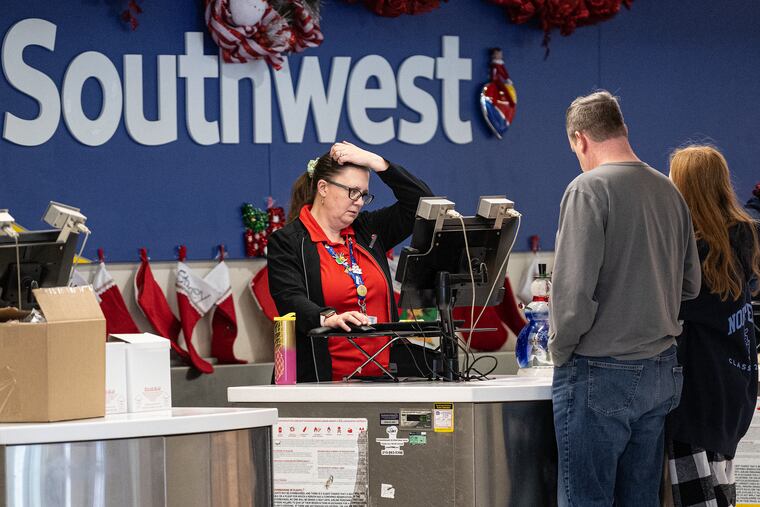Southwest suffers another wave of cancellations as travelers in Philly are impacted
More than 3,000 U.S. flights were canceled on Tuesday, with Southwest impacted the most.

Stranded travelers in Philadelphia and across the country continue to be affected by a wave of flight cancellations stemming from a deadly winter storm that has disrupted air travel since late last week.
Southwest has been impacted the most. Of the more than 3,000 domestic U.S. flights canceled Tuesday, more than 2,500 were Southwest’s, according to the tracking website FlightAware. Southwest’s cancellation rate was 63% Tuesday, while no other major U.S. airline had a cancellation rate above 2%.
Problems are likely to continue at least into Wednesday, where there are already more than 2,500 cancellations with nearly 1,200 for Thursday, according to FlightAware, as the airline tried to restore order to its mangled schedule.
Company shares closed down 5.96% Tuesday, to $33.94.
Philadelphia International Airport wasn’t affected as severely as many other airports. There were 44 cancellations and 93 delays overall as of Tuesday afternoon, and spokesperson Heather Redfern said many were due to issues at such airports as Buffalo Niagara International, which didn’t reopen on Tuesday after being buried in more than four feet of snow.
» READ MORE: Philly air travelers continue to grapple with flight delays, cancellations
In an interview with the Wall Street Journal, Southwest CEO Bob Jordan said the airline planned to operate just one-third of its normal schedule Wednesday, calling the cancellations a “tough day.”
“This is the largest-scale event that I’ve ever seen,” Jordan said.
Late Monday, the U.S. Department of Transportation said that it would examine “Southwest’s unacceptable rate of cancellations” and whether the airline was meeting its legal obligation to help stranded customers.
On Tuesday, President Joe Biden tweeted, “Thousands of flights nationwide have been canceled around the holidays. Our Administration is working to ensure airlines are held accountable,” and encouraged travelers affected by cancellations to go to the DOT’s dashboard to see whether they were eligible for compensation.
The issues at Southwest appear to stem from a combination of factors, including the busy holiday travel season and a deadly winter storm that has killed at least 28 people in western New York. Chicago Midway International Airport and Denver International Airport — home to two of Southwest’s largest hubs — were hit especially hard by the storm.
Unlike other airlines, Southwest uses a point-to-point system, which means planes go from destination to destination without returning to a hub (Philadelphia International, for instance, is an American Airlines hub). That means bad weather affects more than just singular routes around the country; it backs up the entire system, according to the New York Times.
Adding to the backlog of travelers: Southwest has a policy of not rebooking its passengers on other airlines.
» READ MORE: The 3 big questions to ask when your flight is canceled or delayed
As a result of the storm, flight crews ended up out of place and not in the cities the airlines needed them to be in for operations to continue. That cascaded into the thousands of cancellations for Southwest on Monday and Tuesday, according to spokesperson Jay McVay.
“We’ve been chasing our tails trying to catch up and get back to normal safely,” McVay told reporters Tuesday afternoon.
Southwest’s schedule also features shorter flights with shorter turnaround times, which a FlightAware spokesperson told CNN was causing some of the problems.
McVay also acknowledged issues with the airline’s systems, with flight crews unable to coordinate with the company to reschedule assignments, especially as the storm moved east across the United States and impacted more of Southwest’s key hubs.
“So not so much technology as it was sheer manpower to answer all of these calls, and reassign pilots and flight attendants to the flights they need to be on,” McVay said.
Leaders of unions representing Southwest pilots and flight attendants blamed antiquated crew-scheduling software and criticized company management.
Casey Murray, president of the Southwest Airlines Pilots Association, said the airline failed to fix problems that caused a similar meltdown in October 2021. He told CNN he thought the airline’s technology contributed to the widespread issues, noting that some of the company’s operations haven’t changed much in 20 years.
“We’ve been having these issues for the past 20 months,” Murray said. “We’ve seen these sorts of meltdowns occur on a much more regular basis and it really just has to do with outdated processes and outdated IT.
Redfern, the Philadelphia airport spokesperson, advised passengers to sign up for text or email alerts with their airlines for the latest flight information.